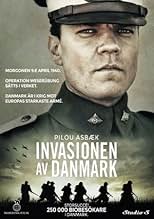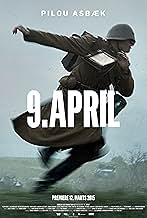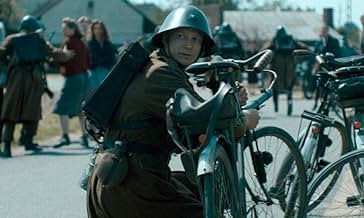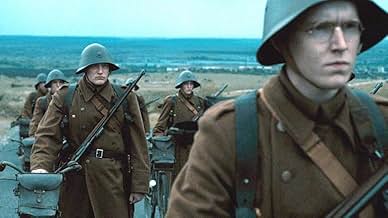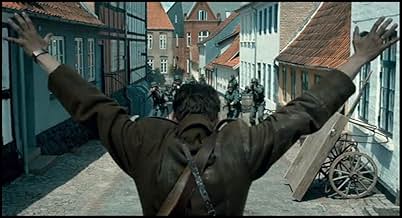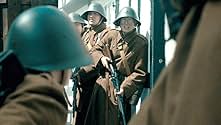AVALIAÇÃO DA IMDb
6,6/10
6,9 mil
SUA AVALIAÇÃO
Em 9 de abril de 1940, a Alemanha invadiu a Dinamarca. Com base em eventos reais - no sul da Jutlândia, uma unidade militar em bicicletas foi enviada ao sul para ajudar a conter os alemães a... Ler tudoEm 9 de abril de 1940, a Alemanha invadiu a Dinamarca. Com base em eventos reais - no sul da Jutlândia, uma unidade militar em bicicletas foi enviada ao sul para ajudar a conter os alemães até o reforço.Em 9 de abril de 1940, a Alemanha invadiu a Dinamarca. Com base em eventos reais - no sul da Jutlândia, uma unidade militar em bicicletas foi enviada ao sul para ajudar a conter os alemães até o reforço.
- Prêmios
- 3 indicações no total
Martin Greis-Rosenthal
- Løjtnant Gjermansen
- (as Martin Greis)
Sebastian Bull
- Menig Lundgren
- (as Sebastian Bull Sarning)
Avaliações em destaque
I am an Englishman who lives in Denmark with a great interest in military history generally. This film captures extremely well the first 6 hours of the German invasion. I found it accurate, well made and well acted. A simple, straightforward story well told.
The Danes surrendered after 6 hours.The Germans lost 101 men killed or wounded. The Danes lost 26 killed and 23 wounded. The Danes didn't have a chance. It is true that, during the war, the Germans recruited SS units from Denmark, these were chiefly from Southern Jutland which had been a part of Germany from 1864 until 1920 and had extremely strong German family connections and Germanic culture.
The Danes surrendered after 6 hours.The Germans lost 101 men killed or wounded. The Danes lost 26 killed and 23 wounded. The Danes didn't have a chance. It is true that, during the war, the Germans recruited SS units from Denmark, these were chiefly from Southern Jutland which had been a part of Germany from 1864 until 1920 and had extremely strong German family connections and Germanic culture.
This movie gives a very honest account of the situation in the morning hours of the 9th of April 1940. The Danish soldiers did their duty despite being in a hopeless situation abandoned by their generals and politicians.
It's a movie made by a Dane for the Danish audience and it captures the way Danish society and the Danish Army was at that time.
I loved it! It's a small piece of Danish history coming to life.
Just a note on some of the other reviews in here. Don't try putting Russian politics into this movie. There is no glorification of any Danish effort during the war here. And it is not looked upon as such in Denmark. Focus on good movies - not the old er new conflicts between East and West. This is not a propaganda movie in any way - maybe you seeing it that way tells more about your view on the world than on the essence of this small masterpiece of Danish filmmaking.
It's a movie made by a Dane for the Danish audience and it captures the way Danish society and the Danish Army was at that time.
I loved it! It's a small piece of Danish history coming to life.
Just a note on some of the other reviews in here. Don't try putting Russian politics into this movie. There is no glorification of any Danish effort during the war here. And it is not looked upon as such in Denmark. Focus on good movies - not the old er new conflicts between East and West. This is not a propaganda movie in any way - maybe you seeing it that way tells more about your view on the world than on the essence of this small masterpiece of Danish filmmaking.
I have to say that I'm very impressed with this movie. I had always assumed that the Danes were German sympathizers and did not put up an effective response to the German Invasion. This is definitely not so! Our little Bicycle platoon of Brave Danish Warriors, definitely gave the Huns a run for their money.
In the movie, the Machine gunners are instructed to target the armored vehicles. I really couldn't understand why until I read this...
"The German high command tried to present the attack on Denmark as a peaceful invasion in an attempt to score propaganda points, so German losses were never released. They succeeded in this, and most of the world believed Denmark did not put up any resistance against the invasion.[37]
However, in 2005, the archives of the Danish weapons manufacturer DISA ('Danish Industrial Syndicate') were opened. DISA produced the Danish 20 mm cannon that took out (relatively) many German vehicles. The Germans were naturally very interested in this weapon and had forced the syndicate to export them to Germany. And in selling them to the German army, they got their best argument from the Germans themselves: they told the company that 203 soldiers had been killed or wounded by the guns in Jutland.[38]"
In the movie, the Machine gunners are instructed to target the armored vehicles. I really couldn't understand why until I read this...
"The German high command tried to present the attack on Denmark as a peaceful invasion in an attempt to score propaganda points, so German losses were never released. They succeeded in this, and most of the world believed Denmark did not put up any resistance against the invasion.[37]
However, in 2005, the archives of the Danish weapons manufacturer DISA ('Danish Industrial Syndicate') were opened. DISA produced the Danish 20 mm cannon that took out (relatively) many German vehicles. The Germans were naturally very interested in this weapon and had forced the syndicate to export them to Germany. And in selling them to the German army, they got their best argument from the Germans themselves: they told the company that 203 soldiers had been killed or wounded by the guns in Jutland.[38]"
The term "War movie" is almost synonymous with Second World War movies. Every nation has a story, down to the smallest individuals, and when there aren't stories, the big story gives great background for fiction. As a result we are doused with WW2 movies. There are good ones, bad ones, boring ones, outright ridiculous ones, and we've seen them all. It is next to impossible to make a really good WW2 movie anymore. Everything that can be told about this war has been told; maybe it can be told again with soldiers of different nationality, different locations, different weapons; but it's really, really difficult to say something that hasn't been told already.
This is why this little movie is marvelous. It actually tells a new story. It's not the meatgrinders of Stalingrad, Omaha Beach, not the death camps, not Dresden burning, not heroes against evil Nazis. It's about the silent, peaceful Denmark which has been overrun in a mere six hours and this was all of the war for them. But how did it happen?
Are a few dozen lives comparable to thousands or millions lost on other battlefronts? What is six hours of "war" to six years? It is easy to dismiss it as nothing, but that's what this movie about. Regardless the short time and negligible losses, it was still war, with young people killing and dying for their country and king. When their comrade fell, it was the same what a Russian, German, British or American soldier felt in a much bigger battle. It is not to be overlooked.
This movie shows us some images from Denmark's family album. Look, this happened to them in 1940. When someone shows you his family album and tells about someone who died in the war, you don't say "Oh, just one of you? Stop whining, our family lost three, so your loss is insignificant." The movie doesn't claim fame. It doesn't say Denmark's disaster was a very big one, or that it's comparable to other events of WW2. It just tells: this happened to us. This is our story. And yes, a kid selling milk actually died on the road that day.
Thank you for this movie, Denmark. We missed your story. Maybe the characters could've been a bit more lively. But again, they are soldiers - what to add to them?
This is why this little movie is marvelous. It actually tells a new story. It's not the meatgrinders of Stalingrad, Omaha Beach, not the death camps, not Dresden burning, not heroes against evil Nazis. It's about the silent, peaceful Denmark which has been overrun in a mere six hours and this was all of the war for them. But how did it happen?
Are a few dozen lives comparable to thousands or millions lost on other battlefronts? What is six hours of "war" to six years? It is easy to dismiss it as nothing, but that's what this movie about. Regardless the short time and negligible losses, it was still war, with young people killing and dying for their country and king. When their comrade fell, it was the same what a Russian, German, British or American soldier felt in a much bigger battle. It is not to be overlooked.
This movie shows us some images from Denmark's family album. Look, this happened to them in 1940. When someone shows you his family album and tells about someone who died in the war, you don't say "Oh, just one of you? Stop whining, our family lost three, so your loss is insignificant." The movie doesn't claim fame. It doesn't say Denmark's disaster was a very big one, or that it's comparable to other events of WW2. It just tells: this happened to us. This is our story. And yes, a kid selling milk actually died on the road that day.
Thank you for this movie, Denmark. We missed your story. Maybe the characters could've been a bit more lively. But again, they are soldiers - what to add to them?
I know a little about April 9th 1940 and the following days in Norway,
since I am a Norwegian. But I knew little about what happened in our
sister country in the south. We both suffered from ignorant
governments that refused to see the reality, even when thrown in their
eyes. The Norwegian government managed to flee to England. The Danish
did not. This movie is about the average person, serving as a solider,
who is drawn into a war before the government realizes there is a
war. This movie is about soldiers fighting, without knowing that they
have already lost. And this is one of the best movies I have seen in a
long time. The story-telling, the acting, the filming, ... If you like
historical war movies, this is a must-see.
Você sabia?
- CuriosidadesWhile bicycle troops might seem risible and impractical to modern eyes, such units were in fact quite common in many countries at the time, including Germany, fielding whole bicycle battalions. Early in World War Two, Japan conquered much of China and South East Asia employing some 50,000 bicycle infantry, such troops taking e.g. Singapore from Great Britain. Bicycle units were also employed by the British during the invasion of Normandy in 1944. Bicycle infantry was seen as cost effective mobility in place of e.g. horses, that needed extra feed and could panic under fire.
- Erros de gravaçãoIn the battle of Lundtoftbjerg(1940), a German soldier is equipped with a MG42 machine gun (developed in 1942).
- ConexõesFeatured in Dansk films bedste: Krig, Klasselærere og Kammerater (2022)
Principais escolhas
Faça login para avaliar e ver a lista de recomendações personalizadas
- How long is April 9th?Fornecido pela Alexa
Detalhes
Bilheteria
- Orçamento
- DKK 22.000.000 (estimativa)
- Faturamento bruto mundial
- US$ 2.102.722
- Tempo de duração
- 1 h 33 min(93 min)
- Cor
- Mixagem de som
- Proporção
- 1.85 : 1
Contribua para esta página
Sugerir uma alteração ou adicionar conteúdo ausente


